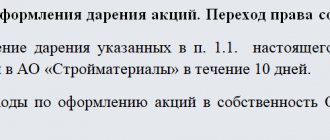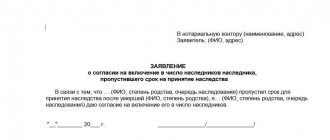Kons AG LLC carries out valuations of all types of property for a notary.
Our specialists will prepare a report today, and the cost of the service will start from 2,000 rubles.
For this amount you will receive a document drawn up in accordance with the Law “On Valuation Activities” and the norms of the Federal Security Service, as well as certified copies of our company’s documents authorizing the provision of services in the field of valuation activities.
Delivery of the assessment report for inheritance is possible on the day of order.
Price - from 2000 rubles | Execution time: from 20 minutes | Delivery of the report - 300 rubles
How securities are inherited
Shares, like other human property, are inherited (Article 1112 of the Civil Code of the Russian Federation).
There are two types of inheritance: by law and by will. In the first case, assets pass to heirs determined by law (children, parents, brothers, etc.) and are divided between them in equal shares. In the second case, the property is distributed as the testator indicated in the will - he has the right to bequeath it to any person, even if he is not related to him. An heir can become the owner of shares transferred to him by inheritance only after making changes to the information contained in the register of shareholders of the enterprise. To do this, you will need a certificate of inheritance. To obtain it, you need to pay a state fee.
The amount of the duty, in accordance with subparagraph. 22 clause 1 art. 333.24 of the Tax Code of the Russian Federation is:
- 0.3% of the value of the inherited property (but not more than 100 thousand rubles) - for children, parents, spouse, brothers and sisters of the testator;
- 0.6% of the value of the inherited property - for the remaining heirs.
An assessment of the value of shares for a notary is necessary in order to correctly calculate the amount of the state duty. You won’t be able to evaluate shares on your own; you need a specialist appraiser who will not only carry out the evaluation, but also document its results.
Why do you need an appraisal when inheriting?
If a person receives bonds or shares as an inheritance, he must provide the notary with a package of relevant documents. Among such papers is an act on the assessment of property securities. It will be needed to calculate the state fee , which is paid for notarization. After paying the state fee, the notary issues a certificate of inheritance.
Specialized organizations issue such an act after submitting documents that confirm the right of inheritance. You can obtain ownership rights by contacting a notary office.
Valuing shares for inheritance is a process that allows you to determine their value.
The assessment can only be carried out by enterprises with appropriate permits for such activities. The assessment procedure is paid and after it is completed, the client receives a document allowing him to enter into the inheritance on a legal basis .
You can receive property by will if such a document was drawn up by the testator during his lifetime. If the administrative document has not been drawn up, the law determines the rights of inheritance according to the queue of potential successors.
How to make a stock valuation for a notary step by step
ConsultantPlus has many ready-made solutions, including a guide to transactions with shares and protection of rights to shares. If you don't have access to the system yet, sign up for a free trial online. You can also get the current K+ price list.
Valuation of shares for a notary is carried out in the following order:
- The heir selects an appraiser and enters into an agreement with him to carry out the appraisal. It is important that the appraiser is a member of a self-regulatory organization of appraisers (you can check your membership on the official website of Rosreestr).
- The heir transfers to the appraiser the documents necessary for the assessment (their list is below).
- The appraiser draws up an appraisal report - an official document certified by a signature and seal and having legal force.
The appraiser can determine the value of shares in one of the following ways:
- actual - the current quotes of the stock on the market are assessed (if it participates in trading on the stock exchange);
- comparative - the publicly available value of shares of enterprises that are similar to the issuer of the shares being assessed in terms of production and financial indicators is used;
- costly - the company’s financial indicators are analyzed - net asset value or liquidation value;
- profitable - the possible income that the share can bring to the owner is estimated; prospects for its growth and development.
The cost of property valuation services is not regulated by the legislator, so it is impossible to give an exact amount. The price varies depending on the region, as well as on the prices set by the appraisal organization or a specific appraiser.
Review of 3 top appraisal companies
Of the variety of appraisal companies today, we can single out 3 of the most reliable companies that will carry out the appraisal quickly, inexpensively and professionally.
The top 3 includes the following companies:
- "SAB Bureau". This Russian company has many years of experience. Its branches are scattered throughout the Russian Federation. The company's employees are members of the self-regulatory organization and have qualification certificates and diplomas from the best domestic universities and international training programs. The main advantages of the company: scientific approach, professional staff, flexible attitude towards clients.
- "Rusfininvest". This company cooperates with both individuals and organizations within Moscow and the Moscow region. Competence, passing an examination by an SRO, detailed, certified reports - these features distinguish Rusfininvest from other appraisal companies such as Transneft, Eurocitybank, Ochakovo, TK Servissnab, etc. The company offers its clients a service to protect reports from appraisal in court
- "Uphill" is a large consulting company that carries out all types of appraisal work in all regions of the Russian Federation. Experts produce reports according to both Russian and international assessment standards, including in foreign languages. Advantages :
- flexible prices;
- discounts and bonuses for clients;
- free delivery of reports;
- short time;
- free consultations and express analysis.
The result of the securities assessment - report
Based on the results of the assessment activities, an assessment report is drawn up. In it, according to Art. 11 of the Federal Law “On Valuation Activities...” dated July 29, 1998 No. 135-FZ, the following information is indicated:
- date of compilation and serial number;
- basis for the assessment;
- information about the appraiser;
- purpose of the assessment;
- description of the subject of assessment;
- the standards that guided the appraiser when conducting the assessment;
- assessment procedure;
- the final cost of the assessed object;
- date of assessment;
- list of documents that were used by the appraiser.
The report is prepared in paper and/or electronic form and signed by the appraiser personally or using an electronic signature.
The value of the securities indicated in the report is the basis for calculating the amount of the state duty - the notary must be guided by the figures obtained as a result of the assessment.
Nuances when trying to sell heritage assets
After the assessment, the heirs strive to sell the shares faster. The motivation is quite simple - fear of bankruptcy of the enterprise, and as a result, lack of income from securities.
When selling securities, you should pay attention to the fact that the buyer reduces the declared value by approximately 3%. When large portions of shares are sold, their price may fall to the 20% threshold.
It is recommended to enter into inheritance rights within six months from the date of death of the owner. If the 6-month period has expired, the heir has the right to receive part of the property through legal proceedings, which in turn will lead to a loss of time and, possibly, the value of the shares.
Thus, evaluating shares for inheritance is a simple and short-term process if you follow all the recommendations and collect a complete package of documents. Payment for the assessment procedure is also justified, because the client receives a document that confirms the right to potential income.
Results
So, the market valuation of shares for a notary is carried out by an expert who has the appropriate qualifications and is a member of the SRO.
Based on the results of the assessment, a report is drawn up indicating the value of the shares included in the inheritance estate. Based on the obtained values, the amount of state duty payable by the heir to whom the assessed shares will be transferred is calculated. You can find more complete information on the topic in ConsultantPlus. Free trial access to the system for 2 days.
What do shares give to the heir?
The shareholder is vested with the following rights:
- The owner of shares can participate in the general meeting of the company and vote when considering important decisions .
- The holder of shares has the right to receive relevant information about the activities of the company .
- The shareholder can participate in the distribution of income . The size of dividends is determined based on the results of the financial year, quarter, and half-year. The payment procedure is established by the Charter. The amount of dividends depends on the number of securities owned by the holder. Income accrues even after the death of the shareholder.
If necessary, a package of securities can be sold . Transactions with shares are carried out by the Moscow Exchange (MICEX).
What are the types of stock prices - 5 main types
Shares have several types of value. Let's take a closer look at each of them.
Type 1. Nominal value
Nominal value is the value calculated by dividing the authorized capital of a joint-stock company by the number of shares issued by this enterprise into circulation.
Example
Let us assume that a company with an authorized capital (officially confirmed in its balance sheet) of 10 million rubles has issued 50 thousand shares. By simple arithmetic we get: 10,000,000 rubles. /50,000 pcs. =200 rub.
This is the par value of the securities.
Important! The very name of the value “nominal” tells us that this type of value is not decisive for ordinary buyers. At par, shares are purchased only by the founders, and then only until the securities are placed on the stock exchange.
For you and me, their market price is more important.
Type 2. Market value
Market value is the price at which a stock "trades" on the stock exchange. Its value is not constant and depends on demand, supply and liquidity. The change in the market price is clearly demonstrated by the graph of changes in the market price of Gazprom shares.
The market capitalization (market value) of a particular company depends on the market value of assets.
Type 3. Book value
Book value is determined by dividing a company's "net assets" by the number of shares of that same company.
Example
Let’s say we have assets on our balance sheet (administrative buildings, workshops, equipment, vehicles, cash in accounts and on hand, etc.) in the amount of 100 million rubles.
But the same company also has liabilities in the amount of 80 million rubles. (calculations for taxes, wages, debt for materials to suppliers, etc.). In total, the company has 50 thousand shares issued.
This means that if the company suddenly decides to pay off all its obligations using existing cash and selling other liquid assets, it will have “net assets” in the amount of 20 million rubles on its balance sheet after the calculations have been made. And then the book value of one share will be: 20,000,000 rubles / 50,000 pcs. = 400 rub.
Book value is also called book value, since it is at this value that shares are reflected in the company’s balance sheet.
Type 4. Liquidation value
Liquidation value is the cost at which settlements with shareholders will be made in the event of liquidation of the joint stock company.
Liquidation value is calculated only after the shareholder company has completely ceased its actual activities.
It is important to remember that the liquidation value of common shares is determined by subtracting the liquidation value of preferred shares from the company's assets remaining for these payments.
Type 5. Investment cost
When talking about investment value, it should not be confused with market value. We have already said that market value is the price at which they are willing to buy it on the stock exchange. But the investment value of securities is their yield and profitability from the investor’s point of view.
An investor, when deciding to invest in certain intangible assets, tries to calculate the benefits of future ownership of these securities, taking into account expected dividends, capital gains of the shareholder company and possible risks.
Read the article on a related topic - “Asset Valuation”.
Brief summary
Analyzing the above, if at a certain stage of life a person is faced with the problem of accepting shares by inheritance, it is recommended to take this very seriously by conducting a thorough analysis of their value in order to understand their value.
Only then should you decide whether to accept them or not in accordance with the will (law) and contact professional appraisers, having previously taken measures to preserve the value of the inherited block of shares - by concluding an asset trust management agreement.
Process order
It is recommended to order an appraisal of the value of shares immediately after opening an inheritance case, since this will take a certain amount of time, after which the notary must have time to collect information about the heirs and distribute the inheritance within 6 months.
Assessment steps:
- Collection of enterprise documentation.
- Analysis of the situation on the securities market, factors that influence their value. External – social, economic, political. Internal – the success of the enterprise.
- Assessment of cost and income factors of enterprise profitability.
- Generalization of results.
- Report preparation.
Inheriting shares involves some risk, as they may fall in value or become worthless if the business goes bust. Alternatively, their value may skyrocket in value, so heirs should not ignore the expert report.
What is opening of inheritance? The answer is presented in the article “What is the opening of an inheritance.” What is an escheat inheritance can be found out here.
Possible difficulties
Difficulties may arise when conducting securities examination:
- There are not enough documents for an objective analysis. If documents cannot be provided due to their absence or impossibility of restoration, the appraiser reflects this in the results of the examination.
- Many relatives of the same level apply for inheritance. In this case, the human factor plays a negative role; misunderstandings arise between relatives regarding the provision of documents for examination.
- Violations in the financial statements of the enterprise. If violations are detected, the appraiser mentions them in the report.
If the heirs do not agree with the presented value of the shares, they can challenge the results in court.
Registrar
Maintaining/storing the register of shareholders is the responsibility of the business entity (Article 44 of Federal Law No. 208-FZ). If necessary, an enterprise can attract a securities market participant.
The registrar records shares and controls their issue. He also keeps records of the owners of the enterprise and nominee shareholders. The register makes it possible to identify the owners of shares. The holder issues an extract from the register upon the first request of the shareholder.
If the shareholder has passed away, you can obtain an extract by submitting a notarial request. Therefore, the successor must first submit an application for registration of inheritance.
After which a written request is made to the registry holder. The response to the request must contain an extract from the register of shareholders. The holder also provides a statement of the value of the securities. However, the share price will be nominal.
The provided deed is the basis for calculating the amount of the fee to be paid by the heir. At the same time, the registrar blocks the account of the deceased owner. It is valid until the registration of the new owner of the shares.
What can affect the cost?
The value of shares is a value that is not constant. The price may change every day. The cost depends on the following factors:
- Activity of the company.
- State of assets.
- The amount of profit of the enterprise.
- Forecast of the organization's performance.
- Possibility of expansion.
- Presence of company encumbrances.
- Availability of enterprise documentation.
- The situation on the stock market.
The assessment will not take into account the fact that the shares are transferred by inheritance. Although this may affect the company’s activities, because successors can sell them immediately after registration. Therefore, the hereditary transfer of shares is included in the forecast for the development of the enterprise.
What documents must be provided to the appraiser?
To initiate the assessment procedure and conclude an agreement with the appraiser, the following set of documents is required:
- Death certificate of the testator.
- Customer's passport.
- An extract from the register of shareholders , which serves as confirmation of the fact that at the time of the death of the testator he owned a certain block of shares.
The appraiser may additionally request other documents that he will need for the assessment: information on fixed assets, information on the issue of shares with copies, reports on issued shares, accounting and financial reports, data on the company’s assets and debts, etc.
The assessment period usually takes 3-5 business days. The assessment is made as of the date of opening of the inheritance (date of death of the testator). If you have all the necessary information to carry out valuation activities on the stock market, an assessment can be obtained within a few hours.
What laws are responsible
The examination of securities is regulated by the legislation of the Russian Federation. The regulatory framework for assessment issues includes articles of the Civil Code of the Russian Federation:
- No. 1152 – about inheriting an apartment.
- No. 1153 – on the procedure for accepting an inheritance.
- No. 1154 – determination of the period for registration of inheritance.
- No. 1155 – on the establishment of rights after the expiration of the inheritance registration period.
- No. 1156 - on hereditary transmission - the transfer of rights to property from the testator to the heirs.
Issues of valuation examination of securities are covered in Federal Law No. 135.
How to Determine Profitability
Securities are a kind of commodity that has its own value, but does not carry material value. Buying and selling them involves concluding transactions between individuals or legal entities.
Profitability is expressed in one indicator: whether it generates income.
This value is calculated as a percentage between the funds spent on its acquisition and the income that is planned to be received in the future.
Investors receive dividends in the form of real money from their returns. It depends on the activities and profits of the company to which they belong. Having determined the profitability of the shares, the appraiser determines their value. Calculations are made using special formulas.






